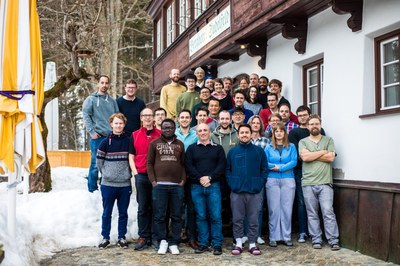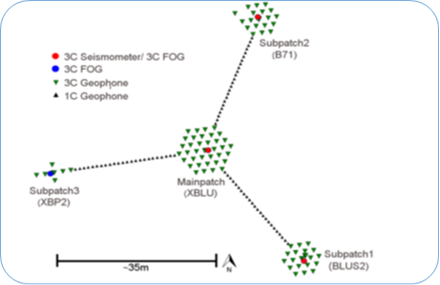8th Munich Earth Skience School
Berghotel Sudelfeld
www.berghotel-sudelfeld.de
March 4-9, 2018.

|
ObsPy meets the slopes! Dense multi-component seismic networks allow the reconstruction of wavefield gradients by finite-differencing providing additional opportunities to reconstruct the wavefield, or recovering subsurface wave speeds. Alternatively, gradients (or related motion components) can be measured directly, for example, by observing rotational ground motions (broadband sensor are just becoming available) or by observing strain (with strain meters or fibre optic cable technology). The gradient of wavefields senses heterogeneities in a different way than the corresponding displacements. In this workshop we want to shed some light onto these aspects by training theory and practical applications how direct or array-derived gradients, strain, rotations, can be used to improve seismic inverse problems. Specific aspects include the separation of wavefields (P, S, Love, Rayleigh, upgoing, downgoing), the impact of heterogeneities on gradients in the context of homogenization, but also aspects of tilt motions on seismic source inverse problems, including related applications. At the beginning of the workshop there will be an introduction to Python/ObsPy. |
 |
|---|
Lecturers: Cedric Schmelzbach, David Sollberger, Cederic van Renterghem (ETH Zurich), Joachim Wassermann, Heiner Igel, Felix Bernauer (LMU), Andrew Curtis (Edinburgh), Yann Capdeville (Nantes)
Practical information: Lectures, practicals will be given from 8-11 and after 3pm (open end). Between 11am and 3pm (depending on conditions, winter sports facilities can be used, www.sudelfeld.de). More info on the winter sport programme can be found here.
Philosophy: This workshop combines the thrill of learning, studying, and practicing seismology, with the thrill of wintersports and being out in nature. Beware that the hotel is isolated in the mountains, no shopping, no public transport to anywhere. WLAN is available free of charge at the hotel. Note that we provide half pension only, in the ski area (within walking distance) there are restaurants where lunch is available.
Costs: 500 € (incl. 5 days half pension, conference facilities, tuition, software). Arrival Sunday March 4 leaving Fri March 9 (lunch time). Note that the costs do not cover: lunch, drinks during meals, winter sports facilities. The number of participants is limited to ~30. First come, first serve basis. The area can be reached by train from Munich Airport (terminal station: Bayrischzell). Please note that there are only a few single rooms. You are encouraged to offer sharing a double room.
Logistics: Please make your way to Bayrischzell Station on Sunday March 4 afternoon, unless you come with your own vehicle. We will provide a shuttle service from the train station to the hotel.
Training Material: Accessible through a virtual box
Final schedule:
|
Morning 8:30-11 |
Afternoon 15-18 |
Evening 20-open end | |
|
Sun 4 March |
Arrival - Icebreaker at 18:00 | Opening | |
|
Mon 5 March |
Python/ObsPy Introduction (Wassermann) |
Python/ObsPy - Intro to workshop (Wassermann, Igel) |
|
|
Tue 6 March |
Wave-equation based processing - Basis, History, Motivation (Schmelzbach) Gradient-based wavefield separation (Van Renterghem, Schmelzbach) |
Practical: Gradient-based wavefield separation (Van Renterghem, Schmelzbach)
|
Late night special: |
|
Wed 7 March |
Gradients and Homogenization (Capdeville) |
Free Afternoon - Parallel slalom |
Bogner Ski night (movies) |
|
Thu 8 March |
Overarching theme: Arrays vs. 6C f-k analysis WassermannPlane wave analysis (Sollberger, Schmelzbach) |
Practical: 6C polarization analysis vs. conventional array processing (Sollberger, Schmelzbach, Wassermnn) 3h |
Mulled wine |
|
Fri 9 March |
Applications, instrumentation aspects, tilt (Bernauer) Spill over - final discussion |
Participants leave. |
If you have questions please contact heiner.igel@lmu.de.
